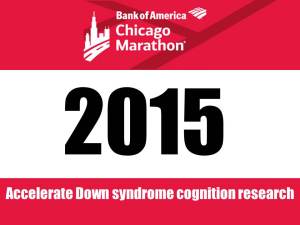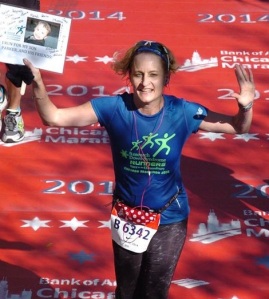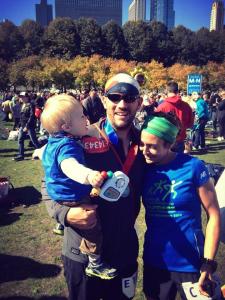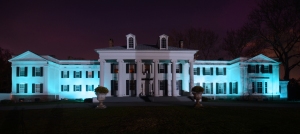– Stephanie Hartman shared this story at our inaugural Sky’s the Limit Awards Gala where we honored Dr. Jamie Edgin, Dr. William Mobley, Sarah Wernikoff and Jim and Patty White. Thank you, Stephanie, for supporting LuMind RDS Foundation and for sharing your personal reasons for supporting Down syndrome cognition research.
By Stephanie Hartman
 Even from a young age, I knew that I was meant to be a mother. I could see through the experience of others and particularly with the closeness within my family growing up, that good parenting is hard work, but immeasurably rewarding and the most important job to be done.
Even from a young age, I knew that I was meant to be a mother. I could see through the experience of others and particularly with the closeness within my family growing up, that good parenting is hard work, but immeasurably rewarding and the most important job to be done.
I became pregnant just before turning 34. My husband Ryan and I learned that our baby boy had heart issues that would require heart surgery in early childhood. We were told that these heart issues were commonly found in children born with Down syndrome, so that was a possibility for our son.
For many reasons, including this, my doctor strongly encouraged that I get an amniocentesis. At that time, it was the only method to determine genetic variances with any certainty.
I was informed that conducting the amniocentesis itself presented a slight risk to my baby. The information would have been helpful for preparation. However, I was unwilling to take the risk.
I viewed this differently than other choices that just affected me. This was a tiny unborn person who only had me to count on to keep him safe and healthy. Also, due to strongly held personal beliefs, I knew that regardless of the results of any test, I was going to give birth to and care for and unconditionally love any child growing inside my body.
In utero, the doctors took measurements of my son’s head, torso, arms and legs. We were told that that our child’s proportions seemed typical and didn’t indicate Down syndrome.
That was enough for us to believe what we thought was ‘’best case” scenario, where our child would have the certain heart defects and require surgery but would otherwise be typical. So we put our heads in the sand and continued our dreams for the future of our family.
Not long after midnight on February 26, 2008, at University Medical Center in Tucson, Taylor Glen Hartman was born. He was tiny, under six pounds….not the nine pounds that had been predicted. Many things were not as predicted.
Soon after the umbilical cord was cut, I could hear the people in the room whispering to each other. I had never had a baby before but I could tell that something was not right. UMC is a teaching hospital, so the room was filled with interns and residents. After cleaning the baby, one of the doctors explained that our son had features consistent with Down syndrome.
What a strange experience. We shouldn’t have been, but we were stunned.
I was trying to simultaneously process this information that would change the course of my life and manage the political correctness of my reaction, given the room full of strangers witnessing this very personal moment.
The hours and days that followed were the most confusing and challenging I had ever experienced.
The instant and beautiful bond between mother and child shown in the movies was not my experience. I understood though that this tiny gift from God in unexpected wrapping needed me. So through the tears, I snuggled him, I sang to him and I nursed him like our lives and our relationship depended on it. It did.
Meanwhile, Ryan left the hospital. It seemed like he was never coming back.
He finally returned with a gift of tulips and a story about a trip to Holland. He also had information. While I was contemplating how to best support the social and educational components of the future advocacy of our child, Ryan gained comfort, strength and direction, reading the work of Dr. Mobley and others. He quickly absorbed so much about Down syndrome, the details of recent advances, and research underway that would maximize our son’s intellectual capabilities.
Thank goodness for Taylor, he has both of us. My narrow focus on advocacy for acceptance and inclusion would have prevented me from even considering medical cognitive interventions. I feared that in so doing, I was in someway rejecting Taylor or trying to cure his Down syndrome like a sickness.
 We love our little rascal. Ds is part of what makes him who he is. Ryan and I wouldn’t take away the Down syndrome even if we could. But I now understand that cognition research is about maximizing the potential of individuals living with Down syndrome, not attempting to cure them of it. It is about helping our loved ones to:
We love our little rascal. Ds is part of what makes him who he is. Ryan and I wouldn’t take away the Down syndrome even if we could. But I now understand that cognition research is about maximizing the potential of individuals living with Down syndrome, not attempting to cure them of it. It is about helping our loved ones to:
- think more clearly,
- rest more peacefully,
- express themselves fully, and
- be as independent as possible.
Isn’t that what any loving parent wants for his or her child?
If Ryan hadn’t come across the valuable work funded by the LuMind Research Down Syndrome Foundation, we may have focused our attention on advocacy, at the exclusion of research.
Taylor would grow to the age that I am today and suffer from the cognitive degeneration that occurs in Alzheimer’s. If later I learned that I could have taken simple actions today to prevent such an onset, I would never forgive myself.
LuMind Research Down Syndrome Foundation is funding research that is very real, tangible, and applicable sooner than later – for children and adults with Down syndrome.
- Dr. Jamie Edgin’s sleep and cognition studies provide insight and possible solutions to the sleep-related issues faced by many people with Down syndrome – and their parents!
- Dr. William Mobley and others are working to help Taylor and others living with Down syndrome to retain the cognitive gains they’ve made through their lives.
- And thanks to the recent revelation of the connection between Down syndrome and Alzheimer’s, both communities can benefit from the research synergy.
I know there are many causes looking for answers from research, but unlike federal funding for conditions such as Cystic Fibrosis at over $2500 per affected person, Down syndrome research only receives $60 per person from the National Institutes of Health.
Thanks to the vision of people like Jim and Patty White and the dedicated volunteers, like Sarah Wernikoff, who have supported private funding for cognition research, there have been many recent amazing breakthroughs.
But, we still have so much more work to do. There is fantastic, groundbreaking research waiting to be conducted by these and other distinguished researchers and rising stars. The only barrier today is lack of funding.
Now more than ever I believe that good parenting is the most important job to be done.
I urge you to be as generous as possible to help ignite new discoveries and propel this important research forward. Please join me in one of the most important jobs we can have as parents – supporting the futures of our loved ones with Down syndrome by funding these research advances.



 Even from a young age, I knew that I was meant to be a mother. I could see through the experience of others and particularly with the closeness within my family growing up, that good parenting is hard work, but immeasurably rewarding and the most important job to be done.
Even from a young age, I knew that I was meant to be a mother. I could see through the experience of others and particularly with the closeness within my family growing up, that good parenting is hard work, but immeasurably rewarding and the most important job to be done. We love our little rascal. Ds is part of what makes him who he is. Ryan and I wouldn’t take away the Down syndrome even if we could. But I now understand that cognition research is about maximizing the potential of individuals living with Down syndrome, not attempting to cure them of it. It is about helping our loved ones to:
We love our little rascal. Ds is part of what makes him who he is. Ryan and I wouldn’t take away the Down syndrome even if we could. But I now understand that cognition research is about maximizing the potential of individuals living with Down syndrome, not attempting to cure them of it. It is about helping our loved ones to: Lottery registration for the Oct. 11 Bank of America Chicago Marathon, one of the world’s premier running events, ends on Tuesday, April 21.
Lottery registration for the Oct. 11 Bank of America Chicago Marathon, one of the world’s premier running events, ends on Tuesday, April 21. 





 First Lady Mary Pat Christie Spearheads “Light the Way” Initiative with First Spouses from Across the Nation to Bring Greater Awareness of Down Syndrome Cognition Research
First Lady Mary Pat Christie Spearheads “Light the Way” Initiative with First Spouses from Across the Nation to Bring Greater Awareness of Down Syndrome Cognition Research 
